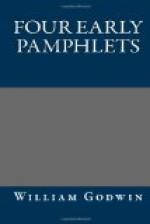We shall present our readers, as a specimen, with the character of that accomplished writer, John Bunyan, whom the poet has generously rescued from that contempt which fashionable manners, and fashionable licentiousness had cast upon him.
“See in the front of Britain’s
honour’d band,
The author of the Pilgrim’s Progress
stand.
Though, sunk in shades of intellectual
night,
He boasted but the simplest arts, to read
and write;
Though false religion hold him in her
chains,
His judgment weakens and his heart restrains:
Yet fancy’s richest beams illum’d
his mind,
And honest virtue his mistakes refin’d.
The poor and the illiterate he address’d;
The poor and the illiterate call him blest.
Blest he the man that taught the poor
to pray,
That shed on adverse fate religion’s
day,
That wash’d the clotted tear from
sorrow’s face,
Recall’d the rambler to the heavenly
race,
Dispell’d the murky clouds of discontent,
And read the lore of patience wheresoe’er
he went.”
Amidst the spirited beauties of this passage, it is impossible not to consider some as particularly conspicuous. How strong and nervous the second and fourth lines! How happily expressive the two Alexandrines! What a luminous idea does the epithet “murky” present to us! How original and picturesque that of the “clotted tear!” If the same expression be found in the Ode to Howard, let it however be considered, that the exact propriety of that image to wash it from the face (for how else, candid reader, could a tear already clotted be removed) is a clear improvement, and certainly entitles the author to a repetition. Lastly, how consistent the assemblage, how admirable the climax in the last six lines! Incomparable they might appear, but we recollect a passage nearly equal in the Essay on History,
“Wild as thy feeble Metaphysic page, Thy History rambles into Steptic rage; Whose giddy and fantastic dreams abuse, A Hampden’s Virtue and a Shakespeare’s Muse.”
How elevated the turn of this passage! To be at once luxuriant and feeble, and to lose one’s way till we get into a passion, (with our guide, I suppose) is peculiar to a poetic subject. It is impossible to mistake this for prose. Then how pathetic the conclusion! What hard heart can refuse its compassion to personages abused by a dream, and that dream the dream of a History!
Oh, wonderful poet, thou shalt be immortal, if my eulogiums can make thee so! To thee thine own rhyme shall never be applied, (Dii, avertite omen).
“Already, pierc’d by freedom’s
searching rays,
The waxen fabric of his fame decays!”
ARTICLE VII.
INKLE AND YARICO, A POEM, BY JAMES BEATTIE, L.L.D. 4TO.
This author cannot certainly be compared with Mr. Hayley.




